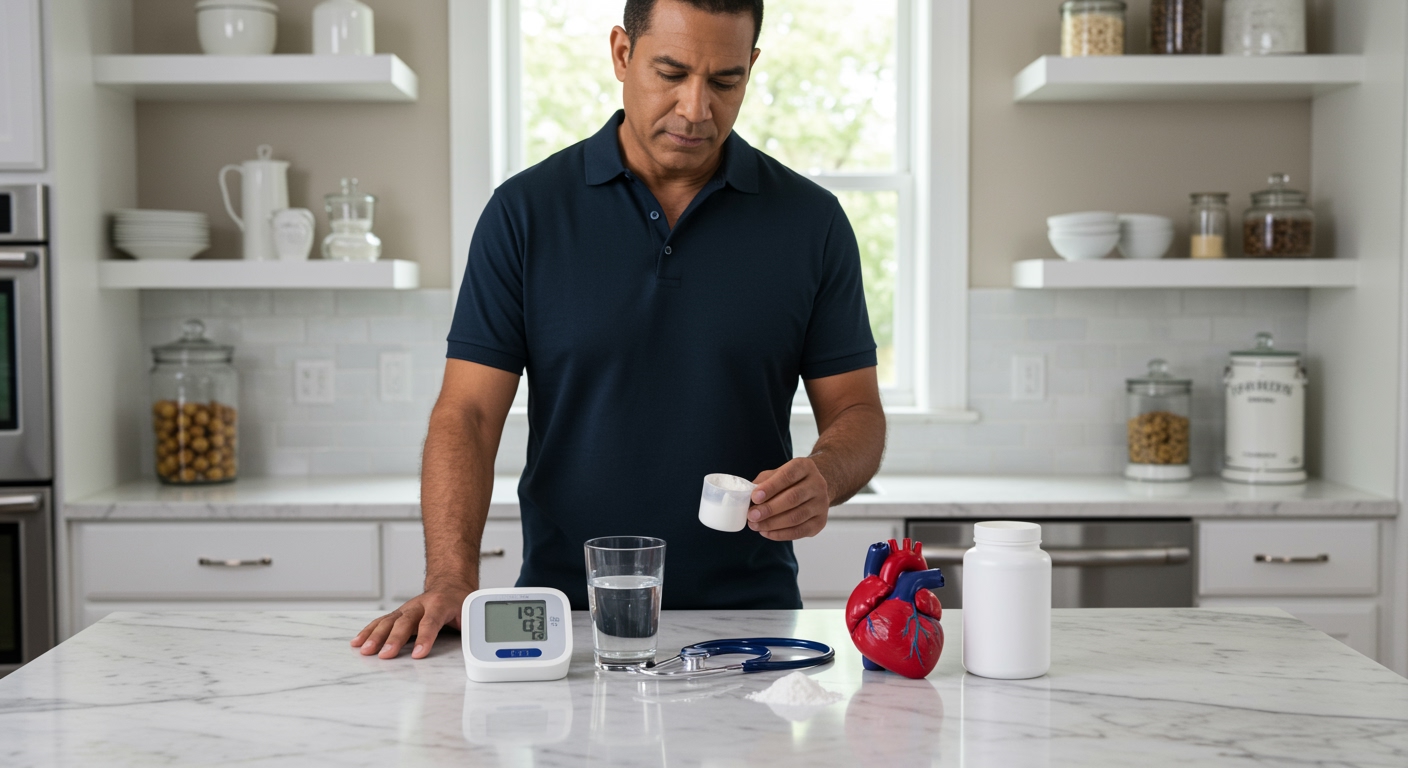✪ Key Takeaway: Creatine appears safe for low blood pressure patients and may even help improve cardiovascular function.
Introduction
You have low blood pressure and wonder if creatine supplements will make things worse.
This concern makes perfect sense because any supplement that affects your cardiovascular system deserves careful consideration when you already have blood pressure issues.
Hi, I’m Abdur, your nutrition coach and today I’m going to explain whether creatine is safe for people with low blood pressure and what the research actually shows.
What Does Research Say About Creatine And Blood Pressure?
Multiple studies show that creatine supplementation does not lower blood pressure further in people who already have hypotension.
In fact, research suggests creatine may have neutral or slightly positive effects on cardiovascular health.
A comprehensive review published in the Journal of Sports Medicine found that creatine supplementation showed no significant negative impact on blood pressure in healthy individuals or those with existing cardiovascular conditions.
The mechanism behind this relates to how creatine works in your body.
Creatine primarily affects your muscles by increasing phosphocreatine stores, which help regenerate ATP during high-intensity activities.
This process does not directly interfere with the cardiovascular regulatory systems that control blood pressure, such as the renin-angiotensin system or baroreceptor reflexes.
✪ Fact: Creatine works primarily in muscle cells and does not directly affect blood vessel function or heart rate regulation.
How Does Creatine Actually Affect Your Heart?
Creatine may actually provide cardiovascular benefits that could be helpful for people with low blood pressure.
Your heart muscle contains high concentrations of creatine because it needs constant energy to pump blood effectively.
When you supplement with creatine, you increase the energy reserves available to your heart muscle, potentially improving its efficiency.
Research shows that creatine supplementation can improve cardiac output during exercise, which means your heart pumps blood more effectively.
This improved cardiac function could theoretically help maintain adequate blood pressure in people with hypotension, especially during physical activity.
Some studies even suggest that creatine may help improve microvascular function, which refers to the health of your smallest blood vessels.
Better microvascular function can improve blood flow and circulation throughout your body, which is often compromised in people with low blood pressure.
✪ Pro Tip: Start with a lower dose of creatine and monitor how you feel to ensure your body responds well.
What About Water Retention And Blood Volume?
One concern people have is that creatine causes water retention, which might affect blood pressure.
Creatine does increase water content in your muscle cells, but this is different from the type of fluid retention that affects blood pressure.
The water retention from creatine is intracellular, meaning it occurs inside muscle cells rather than in your bloodstream or between tissues.
This type of water retention does not increase blood volume or put additional strain on your cardiovascular system.
In fact, the slight increase in total body water from creatine supplementation might actually be beneficial for people with low blood pressure.
Adequate hydration is crucial for maintaining healthy blood pressure, and people with hypotension often benefit from increased fluid intake.
The cellular hydration promoted by creatine could contribute to better overall fluid balance in your body.
✪ Note: The water retention from creatine occurs in muscles, not in blood vessels or tissues that affect blood pressure.
Should You Take Special Precautions?
While creatine appears safe for most people with low blood pressure, you should still take some reasonable precautions.
Start with a standard maintenance dose of 3-5 grams daily rather than using a loading phase, which involves taking 20 grams per day for the first week.
This gradual approach allows you to monitor your response and ensure you do not experience any unexpected effects.
Pay attention to how you feel during the first few weeks of supplementation, particularly noting any changes in energy levels, dizziness, or fatigue.
If you take medications for low blood pressure or other cardiovascular conditions, consult with your healthcare provider before starting creatine.
While drug interactions with creatine are rare, your doctor can provide personalized guidance based on your specific health situation.
Also ensure you maintain adequate hydration when taking creatine, as proper fluid intake supports both the supplement’s effectiveness and healthy blood pressure maintenance.
✪ Pro Tip: Keep a simple log of how you feel for the first month to track any changes in your symptoms or energy levels.
The Bottom Line
Creatine supplementation appears safe for people with low blood pressure and may even provide some cardiovascular benefits.
Your health is too important to leave to guesswork, so always prioritize professional guidance over internet advice when dealing with medical conditions.
I would love to hear about your experience with creatine or any questions you might have about supplements and low blood pressure in the comments below.
References
At NutritionCrown, we use quality and credible sources to ensure our content is accurate and trustworthy. Below are the sources referenced in creating this article:





